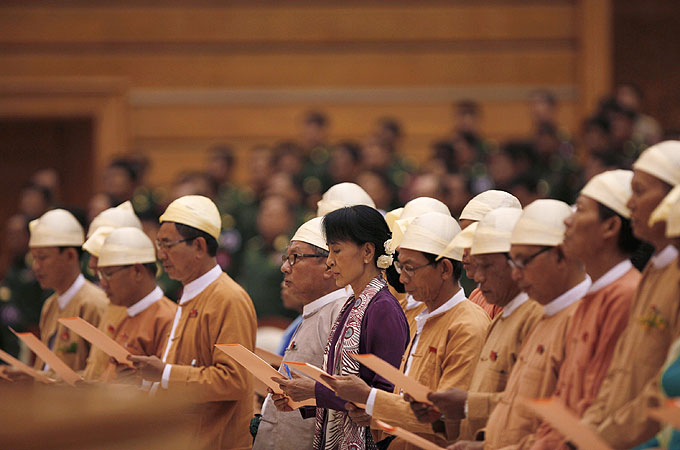
Suu Kyi stood to read the parliamentary oath in unison with other members of her NLD party
Wednesday's event marks a historic development for the country and for the Nobel laureate who waged a two-decade struggle against its military government.
The oath, taken in front of lower house speaker Shwe Mann, states members will "safeguard and abide by the Constitution of the Union" and "hold always in esteem (the) non-disintegration of the Union, non-disintegration of national solidarity and perpetuation of sovereignty".
Speaking briefly to reporters after the swearing-in ceremony, Suu Kyi said her focus will be "to carry out our duties within the parliament as we have been carrying out our duties outside the parliament for the last 20 or so years".
Suu Kyi's National League for Democracy [NLD] swept by-elections on April 1, but its successful candidates initially refused to take their seats because of a dispute over part of the oath relating to the constitution.
The NLD had refused to take the oath to "safeguard the constitution". Instead, it wanted to swear to "respect" it.
The party backed down on Monday and said its politicians would swear the oath, but said it still disputed the wording and wanted to amend a constitution that it says is undemocratic and gives wide powers to the military.
"We've always believed in being flexible throughout the years of our struggle because that is the only way in which we can achieve our goal without violence," Suu Kyi told a news conference in Yangon on Tuesday.
"I don't think flexibility will be a new concept for us."
The dispute with the ruling army-backed party over the oath raised fears for a delicate detente with President Thein Sein, a former junta general who has overseen a year of sweeping reforms in the resource-rich country.
Suu Kyi's entry into Myanmar's political system comes after years of resistance to the army's attempts to enshrine its grip on power.
While Suu Kyi and many of her supporters were in detention in 1990, her NLD swept general elections that year, but instead of handing over power to political leadership, the army banned her party.
The NLD walked out of the military's constitution-drafting process in the mid-1990s.
Suspicion
The party boycotted a general election in November 2010, when Suu Kyi was still under house arrest, saying the poll was rigged in favour of the military-backed Union Solidarity and Development Party (USDP).
The USDP won an overwhelming victory, but a new government under President Thein Sein embarked on political and economic reforms and he persuaded Suu Kyi to enter the political process.
In response to the reforms, Western powers that for years isolated the country over its human rights record, driving it into close ties with giant neighbour China, have begun to lift sanctions.
Suu Kyi, the daughter of the leader of Myanmar's campaign for independence from British rule, will take up her seat alongside uniformed generals and scores of retired military men in the USDP.
But there is deep suspicion on both sides and friction could be looming.
The NLD won all but one of the 44 seats it contested in last month's by-elections after a campaign in which Suu Kyi made the amendment of the 2008 constitution a central theme.
The charter gives the military wide powers, including the ability to appoint cabinet members, take control in a state of emergency and occupy a quarter of seats in parliament.
UN Secretary-General Ban Ki-moon, who was in Myanmar this week for talks with government leaders and Suu Kyi, praised the president as a visionary leader and welcomed Suu Kyi's decision to take her assembly seat.
European Union foreign policy chief Catherine Ashton, who met Suu Kyi last week, also welcomed the NLD's decision and said it could now get to work on the country's problems.
"The important aspect from our point of view is to have her and other parliamentarians from the NLD in parliament," Ashton told a news conference in Bangkok on Tuesday.
"In terms of the constitution, I think this is for them to work out now that Aung San Suu Kyi has come in to parliament."